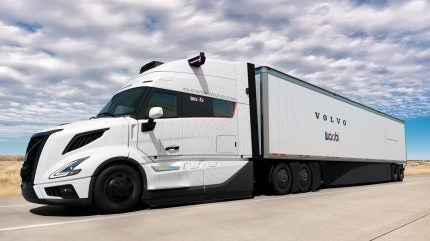
Volvo Autonomous Solutions has partnered with self-driving truck start-up Waabi to advance the development and deployment of autonomous trucks.
Under the partnership, Waabi will integrate its technology into Volvo trucks, including its sensor suite, computing system, and the Waabi Driver software.
This collaboration aims to accelerate the scaling of Waabi’s self-driving systems.
Volvo Autonomous Solutions chief product officer Shahrukh Kazmi said: “This partnership is an exciting next step in developing transformative autonomous transport solutions.
“By combining Volvo’s leadership in automation and safety innovation with Waabi’s expertise in AI-driven autonomous driving technology, we are delivering solutions that tackle the industry’s capacity challenges today and paving the way for scalable, reliable operations.”
The partnership will leverage Waabi’s generative AI technology and Volvo’s expertise in automation and safety to produce the Volvo VNL Autonomous.
Manufactured at Volvo’s New River Valley assembly plant in the US, the truck is built on a platform that caters to various operational needs and supports multiple Volvo Group truck brands.
It is specifically engineered for autonomy, featuring six critical redundant systems, including dual braking and steering, ensuring safe operations.
Waabi’s next-generation AV2.0 approach, which utilises an interpretable and verifiable AI model, is planned to be integrated with Volvo’s autonomous truck.
Waabi founder and CEO Raquel Urtasun said: “We are excited to vertically integrate Waabi’s next-generation AI technology directly into Volvo’s robust and proven technology platform – ushering in a new era of scalable and efficient autonomous transportation.
“Volvo’s leadership in safety, commitment to excellence in engineering, and investment in forward looking innovation makes them an ideal partner to realise the future of self-driving trucks everywhere.”
This partnership marks the continuation of a relationship that began with Volvo Group Venture Capital’s investment in Waabi in January 2023, followed by a contribution to Waabi’s $200m Series B funding round.
The two companies are preparing for testing in 2025, building on the groundwork laid over the past two years.








